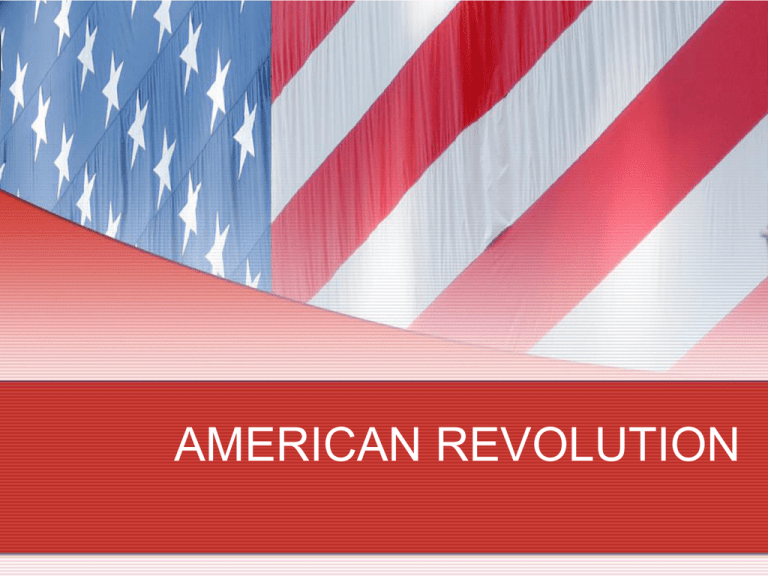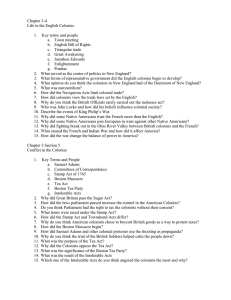AMERICAN REVOLUTION
advertisement

AMERICAN REVOLUTION Chapter 4 Section 1 Events Leading to American Revolution 1.) Sugar Act - 1764 • After the F&I War, 10,000 troops in colonies, colonists resented this • Grenville decided colonists should pay for troops • Pass Sugar Act, tax on sugar and molasses imported from West Indies • Northern Merchants upset • Sam Adams decries unfair tax 2) The Stamp Act – March 1765 • Britain - colonists should help pay debt from F&I War • Duties (taxes) on legal documents, licenses, newspapers, pamphlets, almanacs, playing cards & dice • Sons of Liberty – secret resistance group to oppose taxes, harassed customs agents Samuel Adams was leader • State assemblies said colonists could only be taxed by their reps in colonial govs, not Britain Effect of Stamp Act • Stamp Act Congress – delegates from 9 colonies met • formed the Declaration of Rights and Grievances • no taxation without representation • Colonies acted as one • merchants agreed not to import British products • Stamp Act was repealed in March 1766 3) Townshend Acts - 1767 Taxes on materials imported to colonies (lead, paper, paint, 3 penny tax on tea) Effect: 1) Protests – boycotts (women made own clothes and tea) 2) Committees of Correspondence – formed to communicate about threats to liberties, by 1774 it was a network linking colonies 3) Smuggled goods so British pass Writs of Assistance (can search any colonial ship or building to check for smuggling) British seized ship owned by John Hancock, said he was smuggling • Seizing ships led to riots – 2,000 troops sent to Boston 4) Boston Massacre – March 5, 1770 • Competition for jobs between colonists & soldiers • Mob gathered at Customs House, taunted guards • armed clash broke out • Crispus Attucks and 4 others died – perceived as British attack on defenseless citizens Event was used as “propaganda” – made people upset with Britain 5) Tea Act • British East India Co. losing $ • Allowed to sell tea without taxes, hurting colonial tea sellers Effect: • Boston Tea Party - December 16, 1773 Colonists asked gov to return tea, he refused About 100 men dressed as Indians boarded ships in Boston Harbor and dumped tea overboard 6) Intolerable Acts (Coercive Acts) – 1774 Punished colonists for refusing to pay for tea • Closed port in Boston • English trial for British soldiers charged with murder in the colonies • Changed charter of MA – council appointed by British; town meetings needed permission • Colonists must house and feed British soldiers (Quartering Act) Intention – to bring MA under control Result – united colonies in opposition to Britain Effect of Intolerable Acts • First Continental Congress – September 1774 • 56 delegates met in Philadelphia • formed Declaration of Colonial Rights, defended right to run their own affairs • supported protests in Massachusetts • stated if British used force, they should fight • agreed to reconvene in May 1775 if demands weren’t met • Minutemen – volunteer soldiers, ready to take up arms, trained & organized into the militia before the war began Paul Revere’s Ride - April 18, 1775 • Gen. Gage learned colonists were storing weapons, planned to march on Concord and destroy munitions • Dr. Warren found out, told Paul Revere, who formed network of riders to spread the alarm • “The Regulars are Coming!” (not Redcoats!) Lexington & Concord, April 19-20, 1775 • British arrived in Lexington, 70 minutemen there • British told them to leave • Someone fired a shot (shot heard around the world) • Battle lasted 15 minutes • 8 killed, 10 wounded, 1 British soldier injured • British marched to Concord, arsenal was empty • 3,000-4,000 minutemen there, fired on troops from behind stone walls and trees (learned in F&I War) • British retreated back to Boston





